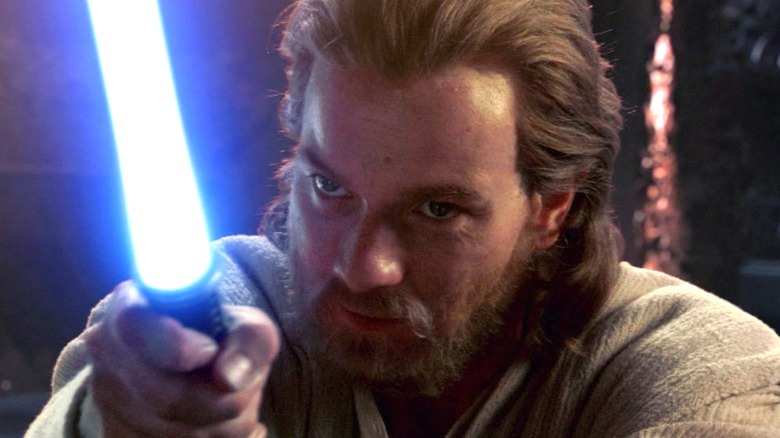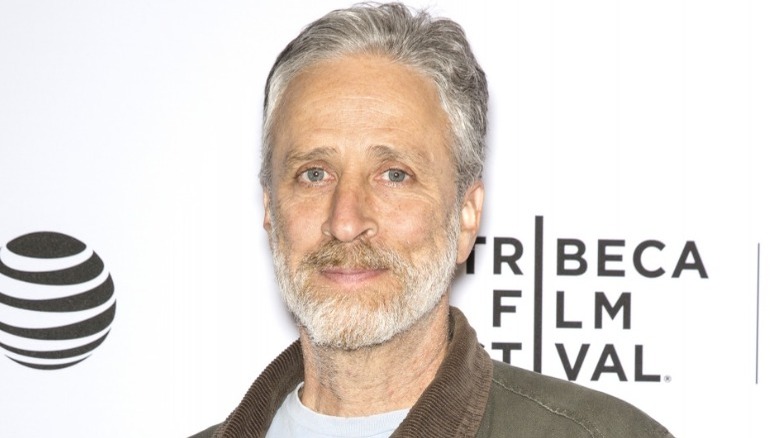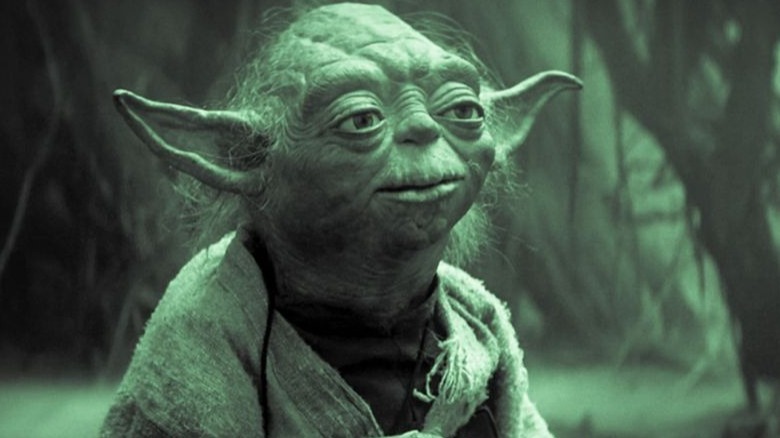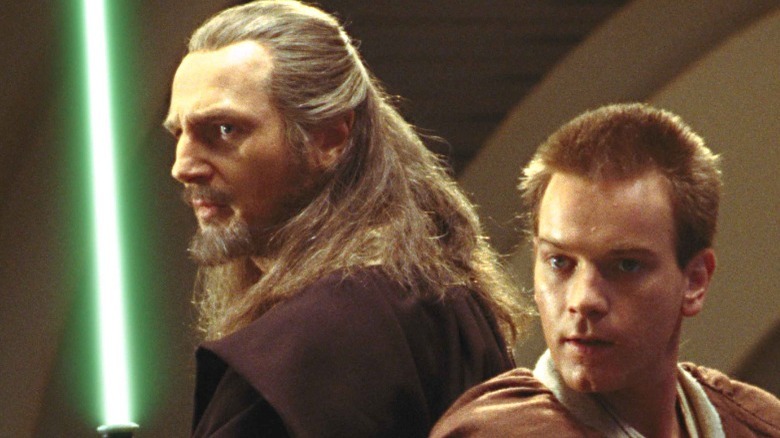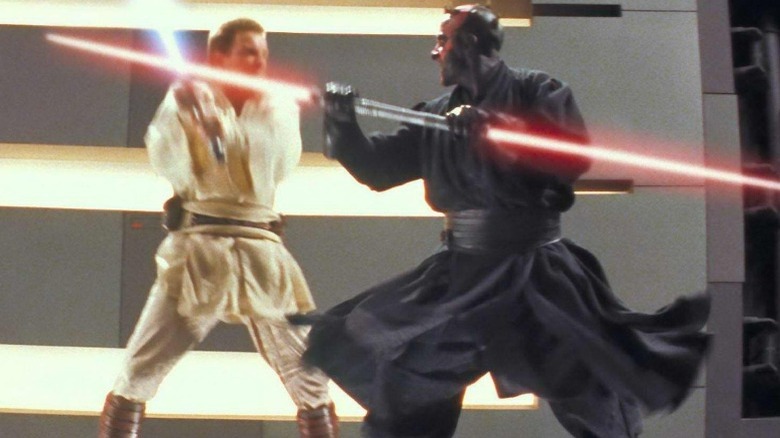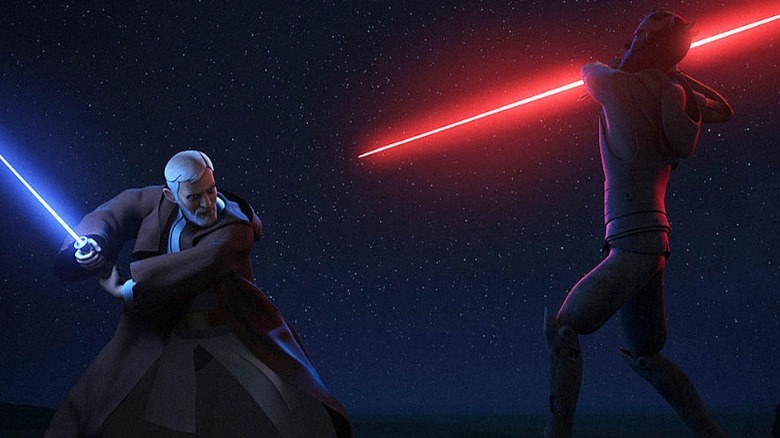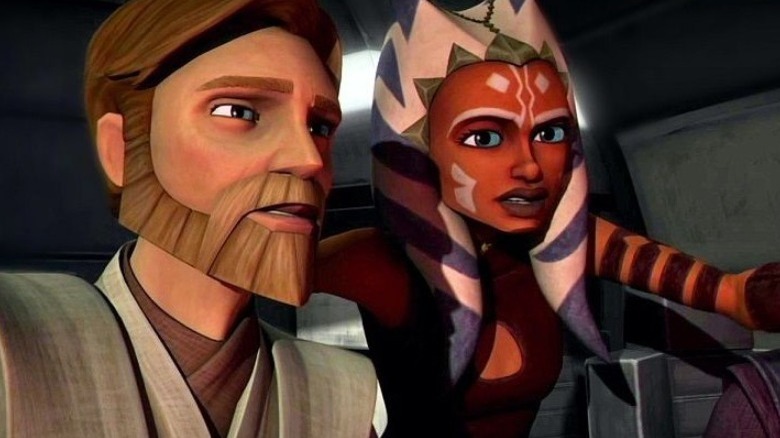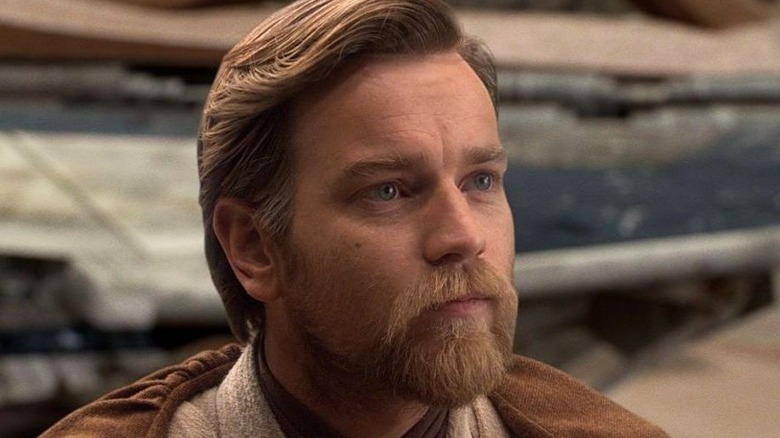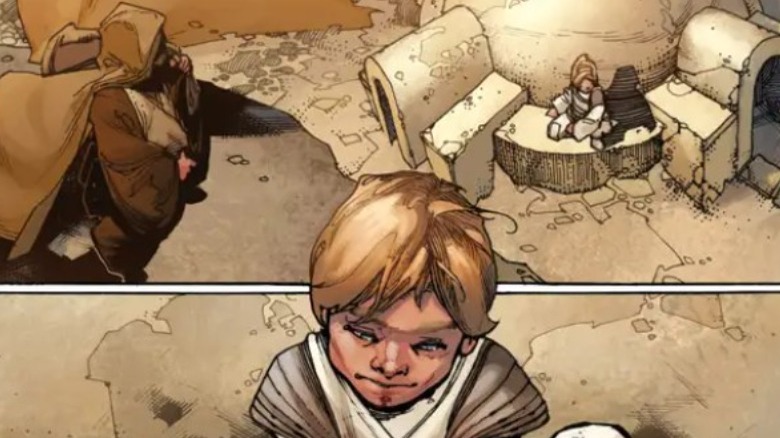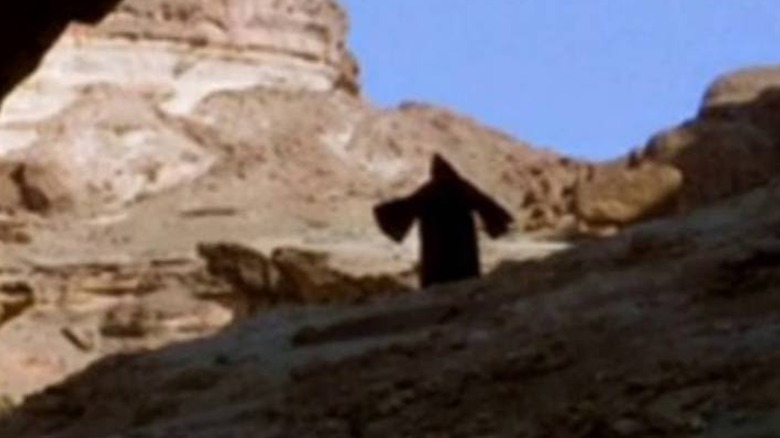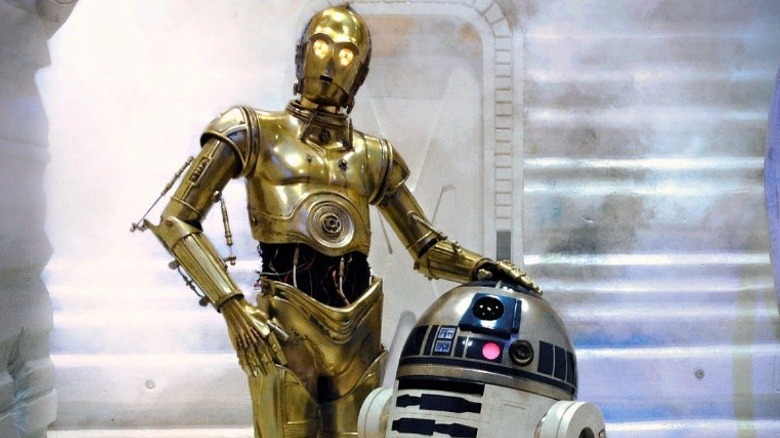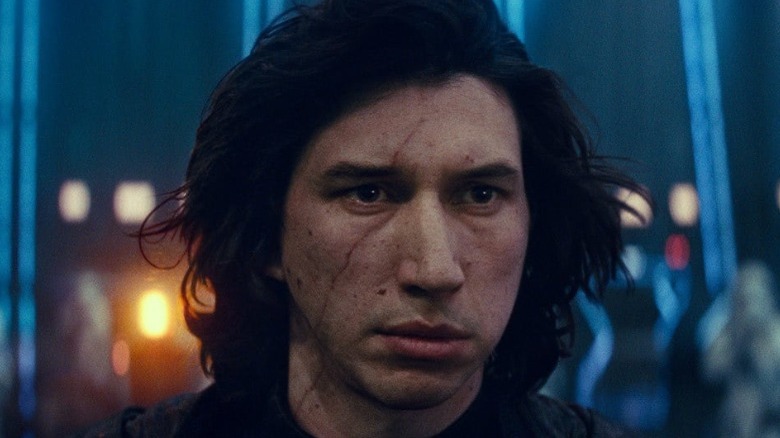The Untold Truth Of Obi-Wan 'Ben' Kenobi
If you were to picture the encyclopedia definition of a strait-laced powerful Jedi, Obi-Wan Kenobi is likely the image that comes to mind. From the first moment we saw him on screen, Obi-Wan was wielding the Force with style, always standing tried and true as a soldier for the Jedi Order despite the dissolution of the ancient organization and his exile. This didn't change when we eventually witnessed his formative years as a padawan and Jedi Knight, complete with a seat on the Jedi Council. Obi-Wan Kenobi stood as bearer of light against the billowing clouds on the horizon. Even when he had every reason to condemn the Order's blind arrogance and subsequent misfortune at the hands of the burgeoning Sith threat, the Jedi Knight remained unmoved and determined to aid in the fight for freedom and to establish democratic order again in the galaxy.
Obi-Wan's status among the fandom, and the endless waves of merchandise, is top notch. In terms of screentime, Obi-Wan covers a lot of ground between the animated series and the feature films. He even had starring roles in past video games such as "Obi-Wan" and "Jedi Starfighter," as well as numerous comic-book series and novels centered him.
Thankfully, Disney+ is on the verge of bringing Ewan McGregor back in the role he further developed on the foundation provided by the late Alec Guinness from the original trilogy. While it feels like there's still plenty of room for Obi-Wan stories left to tell, there are a lot of lesser-known details and history available to the eager fan willing to dive in. This is the untold truth of Obi-Wan Kenobi.
Obi-Wan's home planet is named after Jon Stewart
Fans are often divided by George Lucas's late-career contributions to the "Star Wars" franchise. In some ways, it seems like he is both the best and worst thing to ever happen to overall series, but when Lucas speaks of "Star Wars" lore, his words become law — even if he's joking.
At the Star Wars Celebration V of 2010, Lucas was being interviewed by Jon Stewart, who observed that we know about the home worlds of a majority of the main characters, but not Obi-Wan Kenobi. So he posed the question: where does Obi-Wan hail from? Lucas paused to think, spurring Stewart to laugh and exclaim "don't make it up!" Lucas sarcastically shot back that he'd never make something like this up, then proclaimed that Obi-Wan's home world is the planet of Stewjon — an obvious amalgamation of Jon Stewart's name.
While the moment was played for laughs, it could now be canon. If you visit Obi-Wan's page on the official "Star Wars" site, you'll find that Stewjon is listed in his databank profile.
Obi-Wan's Jedi training lineage traces back to Yoda
In "Star Wars" lore, there's something to be said about the bond between a padawan and the trainer. As Jedi are instructed to forsake their emotional ties and relationships, a padawan's closest familial bond becomes the trainer who instructs them on their journey to becoming a Jedi Knight. Therefore, there's a certain lineage that can be spoken of in the ranks of the Jedi that transcends genetic relationships. After all, the teachings of one Jedi trainer were the teachings once passed down from their trainer.
Obi-Wan Kenobi was, perhaps, the most pivotal and influential Jedi trainer in "Star Wars" history. Not only did he train the greatest Sith Lord in the galaxy, his own skills and training can be traced back to more ancient times in the era of the High Republic — a time when the Republic was fresh and at its peak, expanding to the outer territories within the galaxy.
While the original trilogy highlights dialogue between Yoda and Obi-Wan that references the former training the latter, we know that the bulk of his training came from Qui-Gon Jinn. We learned, of course, that Jinn was trained by Count Dooku, who was trained by Yoda. So no matter how you spin it, Obi-Wan's skills come from Yoda, who learned his abilities as a padawan nearly a millennium prior during the time when the Jedi were a much more influential and active force in the High Republic era. This could be why Obi-Wan's Jedi lineage contains the many Jedi who ultimately played a role in bringing about the prophesied "balance" of the force by the Skywalkers.
Obi-Wan's loyalty to Qui-Gon Jinn stretched beyond his allegiance to the Jedi Order
The journey of Obi-Wan from the Galactic Republic to the Galactic Empire was always accented by his incessant need to do the right thing and live by the Jedi code. In the prequel films, he often appeared to harp on Anakin for suggesting actions outside the tenants of the Jedi principles. He rarely wavered in his loyalties to the Jedi Council.
We were treated to only a single film where we were able to witness the relationship between Obi-Wan and his master Qui-Gon Jinn. Throughout that film, Obi-Wan objected to the decisions of his master to bring Anakin Skywalker into the Jedi fold. Despite his disagreements, however, he supported Qui-Gon's decisions. Qui-Gon constantly challenged the council and was not always willing to agree with their agenda. The council even denied Qui-Gon's request to have the boy trained.
Sticking to his convictions, Qui-Gon commits to teaching Anakin. In his dying breaths at the hands of Darth Maul, Qui-Gon asks Obi-Wan to train Anakin, insisting he is the chosen one. Risking his standing among the Jedi Council, Obi-Wan remains loyal to his dying master's request and assumes mentorship over the young padawan. Despite his own feelings and the Council's original decision, Obi-Wan's loyalty to Qui-Gon Jinn ran far deeper than his own commitment to the Jedi. He even told Yoda he'd go against the council's wishes if he didn't have their support. That is pure dedication.
Obi-Wan's victory over Maul in Phantom Menace was the first Sith defeat by a Jedi in a thousand years
Jedi Knights may be known for their knowledge and prowess in the use of the Force, but Obi-Wan Kenobi became a legend by defeating Darth Maul in "The Phantom Menace." Of course, Darth Maul would return to skulk in the shadows for years to come via animated series — but in the movies, he sure wasn't looking so good the last time audiences saw him, sliced in half.
At the time of their duel, a Sith Lord had not been seen in nearly a thousand years. This solidified Obi-Wan's position among the top ranks of the Jedi, and he was granted the rank of Jedi Knight for accomplishing the feat. The Sith are capable and dangerous foes to a Jedi for a reason, as they can harness many aspects of the Force due to their willingness to shed any moral platitudes of the Jedi Order. Simply put, they operate uninhibited by ancient laws. Obi-Wan's defeat of Darth Maul, given this timeline of events, is one of the more under-appreciated elements of the character.
Obi-Wan had multiple showdowns with Maul beyond Phantom Menace
While the duel between Obi-Wan and Darth Maul was the climactic clash of the first "Star Wars" film (chronologically), the two would be destined (in animation) for a second round, once again locking lightsabers in heated conflict.
On at least three occasions within the animated shows "The Clone Wars" and "Rebels," Obi-Wan and Darth Maul have been reunited in combat. Viewers were told that Darth Maul's own connection with the Force, and his intense hatred for Obi-Wan, kept him alive after being severed in two; eventually, he obtained robotic legs that enabled him to once again operate like normal. However, he resented the Jedi for taking away his future at Palpatine's side. Maul's brother Savage Opress located him, and the two set off on their own path toward building a criminal empire.
At one point in this animated storyline, Obi-Wan wields dual lightsabers in order to fend off attacks from Darth Maul and Savage simultaneously. Ultimately, just prior to the events of "A New Hope," Darth Maul crosses paths with an elderly Obi-Wan one final time on Tatooine. Deducing that he is on a miserable planet in the far corner of the galaxy because he is serving a purpose — protecting someone — Maul activates his sabers for one last fight. The elderly, wise Obi-Wan ends the conflict with a fatal slash across Maul's torso.
In Maul's dying breath, he asks Obi-Wan if the one he protects is the chosen one. Obi-Wan confirms his query, to which Maul states, "he will avenge us." This signifies that Darth Maul always knew the Sith were his true enemies, having ripped him from his home at a young age and indoctrinated him with the harsh realities of the dark side.
Obi-Wan was a father figure to Ahsoka as much as he was to Anakin
Ahsoka is famous for lots of things, one being that she was the only Jedi apprentice of Anakin Skywalker prior to his shift to the dark side of the Force. Her quest to Jedi-hood began in "The Clone Wars" animated series, as Anakin taught the young padawans, becoming increasingly conflicted and looking to Obi-Wan for guidance. Most of the time, Obi-Wan, Anakin, and Ahsoka operated together on missions. Obi-Wan was typically available to help Anakin as a trainer.
Likewise, Ahsoka recognized Obi-Wan's status in the Jedi Order, even going directly to him to seek guidance. When she needed help, he was there, and the two of them forged a special bond. Tragically, following Order 66, Ahsoka and Obi-Wan would never make contact again — primarily due to Obi-Wan's exile. It is quite likely that he never learned that she survived the Jedi slaughter.
Obi-Wan's by-the-book ways unveil certain flaws within the Jedi Order
While Obi-Wan may be a legendary Jedi Knight, he isn't infallible. Most of his shortcomings are due to rigid traditions of the Jedi Order that Obi-Wan adheres to with precision. Perhaps his most destructive flaw is his aversion to matters of the heart.
All along, the Jedi have been fools to deny their emotions and attachments. Attempting to avoid emotions and connections makes them more susceptible to volatile moments they aren't adept to manage, and the result is people like Anakin Skywalker and Kylo Ren.
Obi-Wan was particularly adherent to this rule, and it prevented him from discussing his padawan's attraction to Padme. Had this been an open topic for discussion, perhaps Obi-Wan could have circumvented Palpatine's efforts and reasoned with Anakin before tragedy struck. Likewise, his fear of impacting the fate of the galaxy by bringing up family drama prevented him from telling Luke the identity of his real father.
In "Return of the Jedi," Obi-Wan counseled Luke to kill his father — a task Luke didn't think he could perform. Obi-Wan then lamented a failure that hadn't even occurred. Obi-Wan was likely surprised to learn that Luke's love for his father brought about the downfall of the Empire. In one ballsy show of compassion for his family, Luke proved that hundreds of years of Jedi principles weren't all they were cracked up to be.
Obi-Wan watched over Luke, even rescuing at one point during his childhood
In a 2015 run of "Star Wars" comics published by Marvel, Luke discovered Obi-Wan's old journals. Issue #7, written by Jason Aaron, detailed a time when he rescued Luke from Jabba's enforcers as a young boy. At the time, Luke had become angered by Jabba's enforcers collecting "water" tax from the moisture farms. In an effort to steal water back from Jabba's henchmen, he was caught. The thugs planned to sell Luke into slavery, but luckily for the intrepid little do-gooder, old Ben Kenobi had been watching his back from the shadows. Like a Jedi ninja, he used the Force to dispatch Luke's captors.
The next morning, Luke awakened to aunt Beru asking him what had happened; he stated that he could not remember.
This would seem to imply that Ben Kenobi had the Force to wipe Luke's memory of the event. True to his word and purpose, this wasn't the only time that Obi-Wan demonstrated his watchful eye and protective actions over Luke. The most famous of these, of course, came in live action when he scared away the Tusken Raiders in "A New Hope."
The strange call Obi-Wan used to scare away the Sand People was a Force ability
Have you ever watched "A New Hope" and wondered why that odd sound Kenobi produced when approaching the Sand People (aka Tusken Raiders) scared them away? In actuality, it was a demonstration of one of his more rarely-seen Force abilities.
When Luke and 3PO went off to find the wayward R2-D2, they were besieged by Sand People — but it wasn't the fault of the little astromech droid, who was only doing what Leia had commanded him to do and finding Obi-Wan Kenobi. After knocking Luke unconscious, the Sand People began ransacking his speeder — but when they heard a ghastly noise, they ran for the hills.
For decades, "Star Wars" lore has increasingly come to believe that the noise was supposed to be mimicking a Krayt Dragon. When fans finally had the chance to see one alive on "The Mandalorian," it seemed to confirm not only the theory, but also show exactly why Tusken Raiders hate those hideous things. These days, it is widely considered canon that Obi-Wan used the Force to mimic the monster.
As it turns out, Tatooine isn't merely filled with seedy denizens looking to rob you blind and stab you in the back. It's also home to terrifying beasts, and a place where the ability to occasionally mimic even more terrifying creatures can come in quite handy.
Obi-Wan has seemingly forgotten his relationships with R2-D2, C-3PO, and Chewie
Building an evolving story that is growing in directions both backwards and forward can be extremely difficult work. George Lucas undoubtedly realized this, which is why modernizing plot points eventually became a tug of war with simply telling solid stories — leading to some substantial plot holes.
One such trouble spot comes from Obi-Wan apparently having forgotten R2-D2, C-3PO, and even Chewbacca from his days as a young Jedi Knight, despite all the adventures they shared together (particularly R2). Talk about getting the Heisman — when Alec Guinness sees the droids in "A New Hope," he barely even acknowledges them in most scenes.
With "Star Wars" now receiving regular content since the franchise's shift to the Disney umbrella, it's very possible that this plot hole will be rectified, possibly in the Obi-Wan Kenobi Disney+ series. After all, the business of Jedis can include the induction of memory loss, one of many available Force talents at their disposal.
It would be really difficult, however, to create a series where Ben Kenobi had lost his memory connections with specific people but not all; specific droids but not others. One fan theory is that Obi-Wan may have voluntarily erased any memory that connected him with dissidents of the Empire in order to protect himself and continue to protect Luke. Whatever the case may be, Ben Kenobi showed his age in "A New Hope."
What naming Ben Solo after Obi-Wan signifies for Han and Leia
At first pass, it might seem odd that Han and Leia named their son after Ob-Wan's exile moniker. After all, Han barely knew old Ben Kenobi.
Sure, the old man had tagged along with Luke aboard the Millennium Falcon, only to die at the hands of Darth Vader when the crew was pulled aboard the looming Death Star. But he had no notable interactions with Han Solo, and even Leia knew him primarily from a historical standpoint, an old general of the republic during the Clone Wars.
Nonetheless, the two were aboard the Death Star, and if not for Obi-Wan's diversion (and the shutdown of the tractor beam), the whole group might be dead. Most likely, as the years went by Luke shared Obi-Wan stories with his sister and brother-in-law, along with perhaps the notion that Ben Kenobi had helped bring the two together, and suddenly the name "Ben" became quite appealing for their abnormally angry little newborn.
Obi-Wan was a known leader in the galaxy, his legend as a Jedi Master secure and his connections to the Skywalkers well-established. Obi-Wan trained Luke and Leia's father, and in essence, became the surrogate father Anakin did not have since he was immaculately conceived as a product of the Force. Anyone can speculate what dialogue took place between Force ghosts, Luke, Leia, and Han off-screen.
Still, there's no doubt that Obi-Wan doubled as a quasi-grandfather, orchestrating protection from the Empire. That alone feels like plentiful justification for the honor of naming a child after the man.
